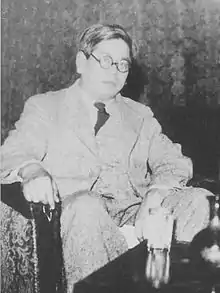Sōichi Ōya
Sōichi Ōya (大宅 壮一, Ōya Sōichi, 13 September 1900 – 22 November 1970) was a Japanese journalist noted for his research and commentaries on popular culture.
Sōichi Ōya | |
|---|---|
 Sōichi Ōya in 1942 | |
| Native name | 大宅 壮一 |
| Born | 13 September 1900 Takatsuki, Osaka, Japan |
| Died | 22 November 1970 (aged 70) |
| Occupation | Journalist |
| Language | Japanese |
| Alma mater | University of Tokyo |
Biography
Born in what is now part of Takatsuki, Osaka, Japan where his father was a soy sauce brewer, Ōya showed an early interest in social issues, and after dropping out of the University of Tokyo, he became involved in the Japan Fabian Society (a gradualist Socialist group). He was also active as a literary essayist and founded the Mass Communication Juku (マスコミ塾, literally the "Mass Communication Workshop"). His legacy includes the Oya Soichi Nonfiction Award, which recognizes the contributions of young journalists, and the Ōya Sōichi Library, a library that is the major archive in Japan collecting popular publications that most institutions ignore. Most of his literary works are included in the Ōya Sōichi Zenshū (大宅壮一全集) published by Sōyōsha (蒼洋社). He was praised "as an iconoclast and hailed for the 'heckling spirit' he had cultivated throughout his career," but he has also been criticized for his critical attitude towards new religions.[1]
Notes
- Dorman, Benjamin. "New Religions through the Eyes of Ōya Sōichi, "Emperor" of the Mass Media". Bulletin of the Nanzan Institute for Religion & Culture (29): 54–67. Archived from the original on 2007-10-16.